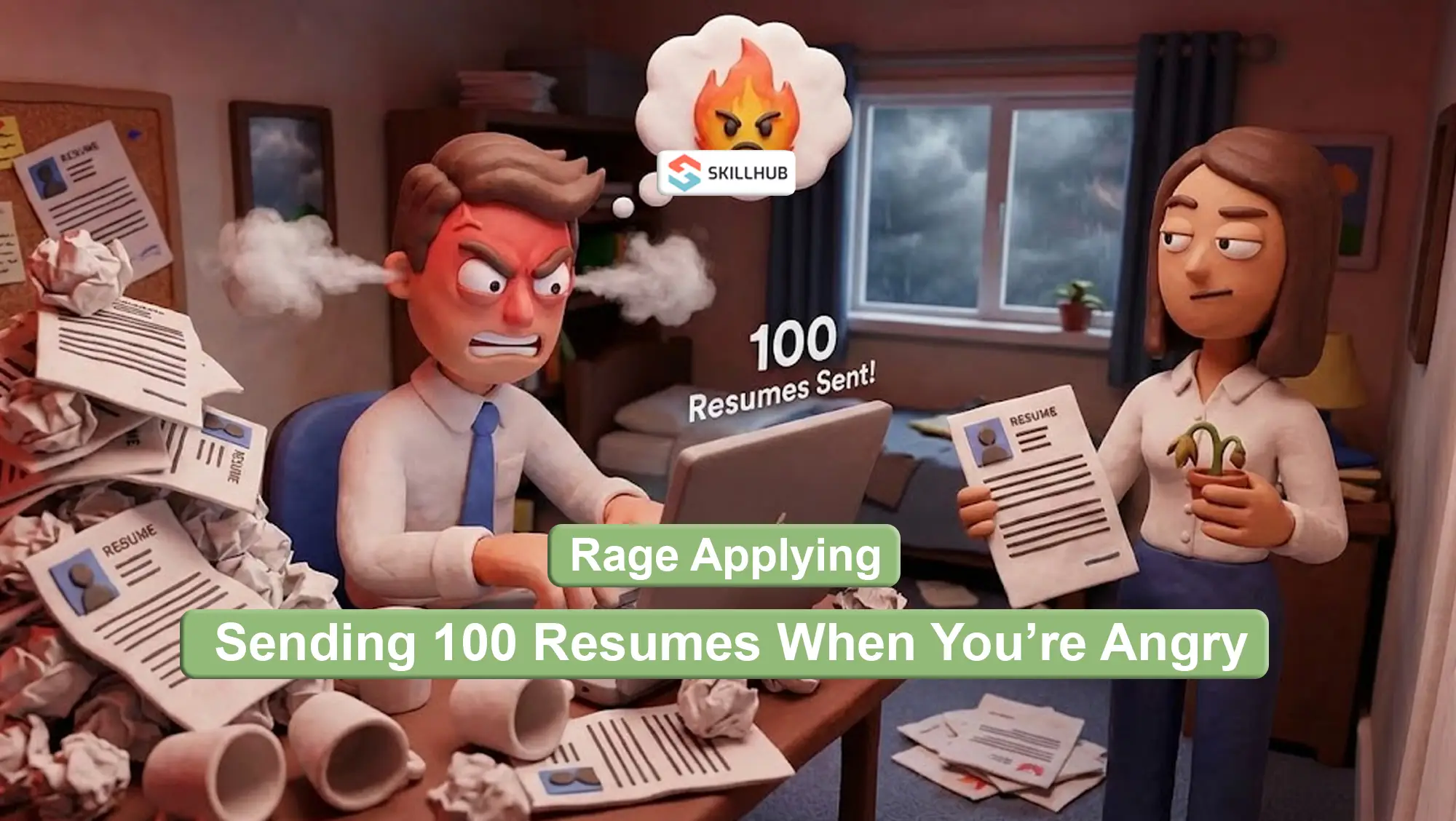The Resume Power Moves You Learn from an Evening MBA Program

For most, this would be a kind of juggling act, but an Evening MBA is more than convenient; it’s very strategic for professionals looking to give their careers that much-needed boost without taking any time off from work. This real-time learning transfers immediately into the workplace, something that weekend classes and online programs just can’t replicate. And when you do it right, it’s also a source of serious resume power, with guidance from SkillHub experts helping you leverage the skills gained to maximize your career potential.
It gets even better: it's not just about the degree attainment, but it's building a story of perseverance, aspiration, growth in skills combined with maintaining career momentum.
1. Translating Work Experience into Leadership Language
But what every manager knows is just how hard it is to prove that leadership potential on paper. The Evening MBA takes that and puts it into measurable results and in leadership-ready language.
You learn to connect theory with practice by attending evening classes while you are managing projects during the day. For example, one class in organizational behavior can help you understand the psychology that underlines motivating a team. Your resumé isn't just saying, "Managed a team of five." Suddenly it says, "Applied evidence-based leadership frameworks to improve team collaboration and performance."
That tonal shift matters: Recruiters find candidates who can show that they led-rather than they did. This program helps reframe regular tasks in the language of strategic leadership, and the resume feels sharper and more intentional.
2. Building hard business skills you can prove
Perhaps the largest single gap most working professionals have in their résumés is the ability to demonstrate measured business impact. You may have people skills or project management experience, but an Evening MBA brings credibility in your technical and analytical capabilities.
Quantitative fields include finance, analytics in marketing, and data interpretation, giving you hard numbers with which to base your work. Instead of saying, "Helped optimize marketing spend", you'll say "Used regression modeling and data analysis to identify a 12% budget efficiency improvement."
Employers love to see quantifiable results. Even better, because you're studying while working, you can generally make your current job a case study or testing ground. You have a feedback loop: what you learn at night you apply the next morning. The result is a resume that shows continuous learning and business fluency.
3. Expanding Your Professional Network — and Making It Count
Networking is one of those terms that gets thrown around a lot-it's almost a cliché-but with an Evening MBA, it's a lived experience: You're surrounded by active professionals working across industries-often well into their mid-career-people just like you. They will not only become your classmates but also future collaborators, mentors, and even hiring managers.
Of course, that network will add to your professional credibility over time. In the process, one line in your résumé-something like "Collaborated with cross-industry peers to develop a market-entry strategy"-will tell it all about the ability to collaborate across disciplines and communicate at the executive level.
Relationships extend over and above what may appear on paper, often leading to opportunities which never make it onto job boards. It's networking with a purpose based on real collaboration-not empty coffee chats.
4. Learning How to Tell Your Professional Story
Arguably, the most underrated skill you develop in an MBA is actually storytelling: taking your achievement and turning it into a great story.
Behind every resume, there is a story: where you started, how you grew, and where you are going. Presentations, case studies, group projects-you learn how to take all of those hard and complex ideas and represent them in a clear and engaging style.
That's a skill directly translatable to interviews and LinkedIn profiles. Your resumé no longer reads as a list of duties; it reads like a trajectory-a story of growth, leadership, and strategic thinking. You stop describing what you did and start explaining why it mattered.
If you do an Evening MBA in San Francisco, that story only gets stronger. The innovation-driven, collaboration-heavy business ecosystem here means your experience will immediately signal to people that you can indeed thrive within fast-moving, high-expectation settings.
5. Developing Strategic Thinking and Decision Making
The shift that every business professional will have to make is from execution to strategy-from doing the work to directing it. Evening MBA programs are structured to ease that transition.
Case-based learning pushes you to think like an executive: you analyze companies, predict trends, weigh risks, and decide with incomplete information. The more you practice, the more you build the mental muscle of strategic reasoning-the very skill employers are seeking in midlevel to senior candidates.
Emphasize in your resume: "Led data-driven strategic initiatives informed by MBA coursework." This is more than proof you've studied business, it's evidence you have practiced executive-level decision-making under real conditions.
6. Implies grit, discipline, and effective time management.
It isn't easy balancing a tough job, course work, and a personal life. That, though, is kind of the point. This would translate for an employer to mean an MBA graduate while working: a professional who can handle pressure and priorities, deliver on time when constrained. Those qualities don't really fit within a skills section all that well, but they shine through in how you talk about your experience. Take, for example: "Completed MBA course work while managing a full-time leadership role." It says little, but it says volumes about resiliency and drive. Anyone who's had to do this knows just how much this takes, and it is a sign of maturity and motivation-two things one cannot fake in an interview.
7. Translation of Knowledge to Measurable Career Growth At the center, the Evening MBA is an accelerator:
You learn the frameworks, then put them into action right away at work. The next time you lead a team meeting, pitch an idea, or negotiate with a client, you'll do it from an informed perspective. The résumé gold, though, is in real-world application-you're not waiting for graduation; you're growing into your current role. Those wins-whether promotion, raises, or taking on new projects-build out your story while you're still in the program. It also means that when you finally update your résumé, you will have examples of how the MBA studies have made a direct impact on your work. You can prove it wasn't some theoretical learning; rather, it was transformational.
8. Building a Personal Brand That Speaks to the C-Suite
These days, personal branding is almost as big in the market as one's technical skill. How one speaks, or describes goals-even the confidence projected through a résumé or interview-builds an image of what one can do. That confidence naturally emanates from the environment of any Evening MBA. You learn how to frame your experience, speak to your strengths, and position yourself for leadership. The result is that by the time you're done, your résumé reads differently. Instead of stating what you know, it says who you are as a professional. And that kind of differentiation is something that shoots your application straight to the top.
9. Why It All Matters
Most people look at an MBA as something which is going to be helpful later on. The Evening MBA completely flips that around. It is about growth now: in your job, in your skills, in how you communicate your value. Your resumé is not just a document but a reflection of proof of evolution; it reflects someone who can manage complexity, think strategically, and grow further under pressure. This advantage of having such a balance between education and work experience is hardly available to any other professional who intends to stay competitive in a world that continues to reward continuous learning. The Evening MBA is not about learning business; it is about learning to tell your business story with impact.
Final Thoughts
More than the qualification to a recruiter, an Evening MBA on a résumé symbolizes being proactive, adaptive, and able to think along long-term lines. And when that MBA experience is told thoughtfully within your professional story, it's one of the strongest differentiators you can have in the most crowded job markets. It is not three new letters after your name; it's about the way those letters change the way one thinks, works, and communicates. Your résumé becomes your proof-not just that you studied business, but that you've become the kind of professional every business wants.
%20(1).png)



%20(1).webp)